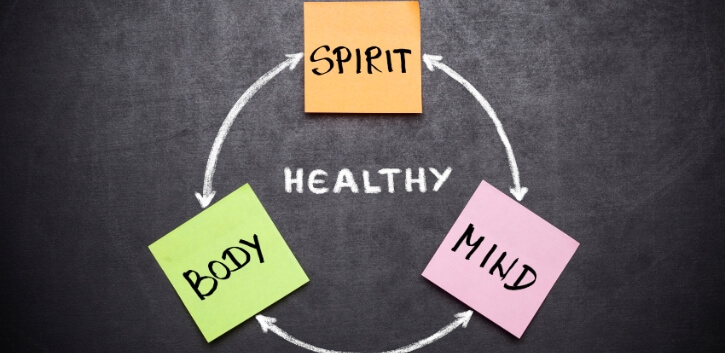INTRODUCTION:
The connection between mind and body is an intricate and powerful one, influencing nearly every aspect of our health. When our mental state is healthy, it has a profound impact on our physical well-being, and vice versa. Understanding and nurturing this mind-body connection is essential for achieving better health and living a more balanced life. This article explores how mental wellness can unlock better physical health and offers practical tips for improving both mind and body.
1. The Science Behind the Mind-Body Connection
The mind and body are not separate entities but are deeply interconnected. The brain communicates with the rest of the body through the nervous system, influencing processes like heart rate, digestion, and immune function. Research has shown that mental states such as stress, anxiety, and depression can directly affect physical health, while positive emotions and mental practices can enhance physical well-being.
How Mental Wellness Impacts Physical Health:
- Stress Response: Chronic stress activates the body’s fight-or-flight response, releasing hormones like cortisol that can harm physical health when elevated for long periods. It can lead to issues like high blood pressure, digestive problems, and weakened immunity.
- Positive Emotions: Positive mental states such as joy, gratitude, and optimism can reduce inflammation, improve heart health, and support a stronger immune system.
2. The Role of Stress in the Mind-Body Connection
Stress is one of the most significant mental factors affecting physical health. While short-term stress can be motivating, long-term or chronic stress can wreak havoc on the body. High levels of stress can contribute to cardiovascular disease, digestive issues, sleep disturbances, and weakened immune responses.
Impact of Chronic Stress on Health:
- Heart Disease: Stress increases heart rate and blood pressure, which can lead to cardiovascular problems like hypertension and an increased risk of heart disease.
- Weakened Immunity: Prolonged stress suppresses immune function, making the body more susceptible to illness and infections.
- Digestive Issues: Stress can disrupt digestion, causing symptoms like bloating, acid reflux, and irritable bowel syndrome (IBS).
3. Harnessing the Power of Mindfulness and Meditation
Mindfulness and meditation are two powerful tools that strengthen the mind-body connection by reducing stress, improving focus, and promoting relaxation. These practices have been shown to lower cortisol levels, reduce anxiety, and enhance overall physical health.
How Mindfulness and Meditation Benefit the Body:
- Stress Reduction: Mindfulness practices help calm the nervous system, promoting relaxation and reducing the harmful effects of stress on the body.
- Improved Sleep: Meditation can improve the quality of sleep by calming the mind and reducing anxiety that may interfere with rest.
- Pain Management: Studies show that mindfulness can help manage chronic pain by altering the way the brain processes pain signals.
4. Physical Activity as a Mental Wellness Booster
Exercise is not only beneficial for physical health but also plays a crucial role in improving mental wellness. Regular physical activity helps to reduce stress, improve mood, and enhance cognitive function. Exercise releases endorphins, which are natural mood elevators, and can be an effective tool for managing depression and anxiety.
How Exercise Enhances Both Mind and Body:
- Mood Enhancement: Physical activity increases the production of endorphins and serotonin, both of which boost mood and promote a sense of well-being.
- Cognitive Function: Exercise improves brain health by increasing blood flow to the brain and supporting the growth of new neural connections.
- Stress Relief: Physical activity can help to manage stress by providing an outlet for tension and promoting relaxation after exercise.
5. The Importance of Emotional Well-Being
Emotional wellness is a critical part of the mind-body connection. Emotions such as happiness, love, and gratitude have a direct impact on physical health. Conversely, negative emotions like anger, fear, and sadness can affect the body in harmful ways.
The Impact of Emotional Wellness on Physical Health:
- Happiness and Health: Positive emotions can lower blood pressure, reduce the risk of chronic illness, and improve immune function.
- Chronic Negative Emotions: Prolonged negative emotions, such as anger and resentment, can contribute to inflammation, cardiovascular problems, and weakened immunity.
- Self-Compassion: Practicing self-compassion, where you treat yourself with kindness and understanding, can improve mental and physical health by reducing stress and fostering emotional resilience.
6. Nutrition and Its Role in the Mind-Body Connection
The food you eat has a direct effect on both your mental and physical health. Certain nutrients are essential for brain function, and a balanced diet supports mental clarity, mood regulation, and cognitive health. Conversely, poor dietary choices can lead to mental fog, irritability, and long-term health issues.
Nutritional Tips for Enhancing Mental and Physical Wellness:
- Omega-3 Fatty Acids: Found in fish, flaxseeds, and walnuts, omega-3s are vital for brain health and can help reduce symptoms of depression and anxiety.
- Antioxidants: Foods rich in antioxidants, like berries, leafy greens, and nuts, help protect the brain from oxidative stress and support cognitive function.
- Gut Health: The gut microbiome plays a significant role in mental health. Eating a diet rich in fiber and probiotics can improve gut health and, by extension, brain health.
7. Building a Holistic Routine for Mind-Body Wellness
Creating a balanced routine that nurtures both the mind and body is key to unlocking optimal health. This means incorporating physical activity, mindfulness practices, emotional support, and proper nutrition into your daily life.

Tips for a Holistic Wellness Routine:
- Morning Mindfulness: Start your day with a few minutes of deep breathing or meditation to set a positive tone.
- Physical Activity: Include at least 30 minutes of physical activity in your day, whether it’s a brisk walk, yoga, or a workout session.
- Connect with Nature: Spending time outdoors can reduce stress and improve mental clarity. Nature has a calming effect on the mind and body.
- Positive Social Interactions: Build strong, supportive relationships and engage in activities that foster emotional well-being.
Conclusion
The mind-body connection is a powerful and dynamic relationship that shapes our overall health. By taking steps to nurture mental wellness, such as practicing mindfulness, exercising regularly, and cultivating positive emotions, you can unlock better physical health. When you strengthen both the mind and body, you are paving the way for a happier, healthier, and more balanced life.




You must be logged in to post a comment.